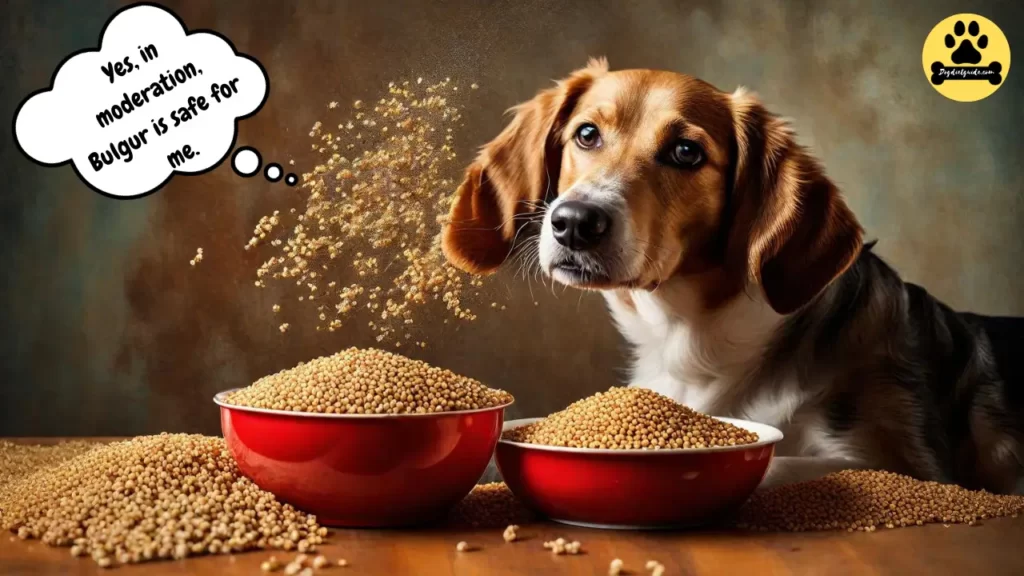As the demand for wholesome and balanced canine diets rises, pet parents often explore alternative grains and ingredients to enhance their dogs’ meals. One such grain that has gained attention is bulgur, a versatile and nutritious wheat product. However, the question lingers: Can dogs eat bulgur?
Overview
Bulgur boasts an array of essential nutrients, including fiber, protein, vitamins, and minerals. In moderation, fiber, in particular, aids in digestive health and can benefit dogs, promoting regular bowel movements. Excessive amounts may lead to digestive upset or unwanted weight gain.
Understanding Bulgur
Bulgur is a whole wheat product that has been cracked and partially pre-cooked. It’s a nutrient-rich grain and a common ingredient in various human dishes due to its high fiber content and nutty flavor.
Can Dogs Eat Bulgur?
The short answer is yes. Dogs can eat bulgur in moderation as it provides a good source of fiber, vitamins, and minerals. When offering bulgur to your dog, ensure it is thoroughly cooked and served plain, without any added seasonings, spices, or ingredients that may be harmful to dogs.
Introducing new foods gradually and in small amounts is advisable to monitor for potential adverse reactions. If your dog has any existing health conditions or dietary restrictions, it’s best to consult your veterinarian before incorporating new foods or adding grain to your pup food.

Benefits of Bulgur for Dogs
-
Nutrient Content: Bulgur is a good source of fiber, vitamins, and minerals, providing nutritional benefits for dogs.
-
Digestive Health: The fiber content in bulgur can support digestive health by promoting regular bowel movements.
-
Energy Source: The complex carbohydrates in bulgur can serve as a healthy energy source for dogs.
-
Weight Management: The fiber in bulgur may help dogs feel full, potentially assisting in weight management.
Risks of Bulgur for Dogs
-
Some dogs may have gluten sensitivities or allergies, and bulgur contains gluten. Monitor your dog for any signs of adverse reactions.
-
While bulgur can be part of a balanced diet, excessive amounts may lead to digestive upset or contribute to an imbalance in the overall diet.
-
Ensure bulgur is well-cooked and plain. Avoid adding seasonings, spices, or sauces that could harm dogs.
Safe Serving Ideas
-
Plain Cooked Bulgur: Serve plain, cooked Bulgur without added salt, spices, or other seasonings.
-
Mix with Dog Food: Mix small amounts of cooked and cooled bulgur with your dog’s regular food.
-
Vegetable Mix: Combine bulgur with dog-safe vegetables like carrots or green beans for added nutrition and variety.
-
Protein Addition: Mix lean protein sources like boiled chicken or turkey with bulgur to create a balanced meal.

Related Post: Can Dogs Eat Pandan?
Moderation is Key
While bulgur can be a nutritious addition to your pup’s diet, moderation is key.
Excessive amounts may lead to digestive upset or unwanted weight gain. Consult with your veterinarian to determine the appropriate serving size based on your dog’s size, breed, and individual health needs.
Related Post: Can Dogs Have Sticky Rice?
Final Thoughts: Can Dogs Eat Bulgur?
In conclusion, bulgur can be a nutritious and flavorful addition to your dog’s diet when prepared and served in moderation. Its high fiber and protein content can improve your dog’s health and well-being.
As with any dietary change, it’s essential to consult your veterinarian to ensure it aligns with your dog’s individual needs and to monitor for any adverse reactions.
When introduced responsibly, bulgur can be a tasty and wholesome treat for your canine companion.




![Can Dogs Eat Blood? 7 Side Effects [Expert Opinion]](https://petskor.com/wp-content/uploads/2022/04/Webp.net-resizeimage-12.jpg)
